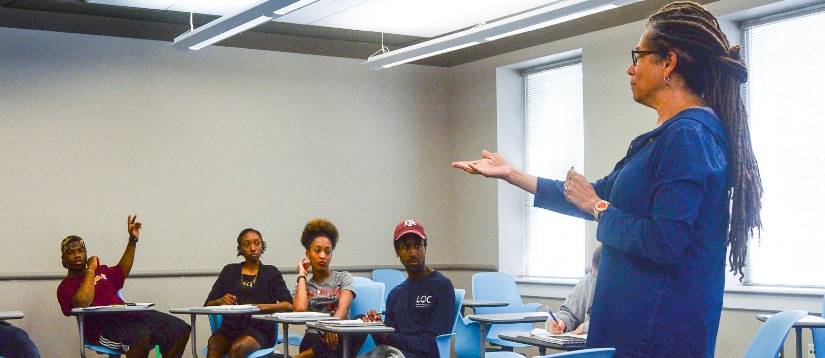Join scholars from USC, Clemson University, College of Charleston, Allen University, Claflin University, and more for in-depth discussions about the growth of Africana Studies programs in South Carolina. Hosted in conjunction with the Annual Robert Smalls lecture at the University of South Carolina, panelists will explore current research, concerns, and debates within the field in the Hollings Program Room of the Thomas Cooper Library at USC. This inaugural symposium is organized by the South Carolina Higher Education Africana Studies Marketing (SCHEASM) Committee.
Thursday, April 21
7 p.m. – 8:30 p.m.
USC Robert Smalls Annual Lecture featuring Angela Y. Davis in conversation with Nikky Finney, Pastides Alumni Center
Friday, April 22
8 a.m. – 9 a.m.
Continental Breakfast, Hollings Program Room, Thomas Cooper Library
9 a.m. – 9:30 a.m.
Symposium Welcome
Panel 1: 9:30 a.m. – 10:45 a.m.
“What’s in a Name? African/a, African American, and Global Black Studies”
Moderator: Kimberly Eison Simmons (USC)
Panelists:
➢ Chris Day (C of C)
➢ L. Kaifa Roland (Clemson)
➢ Andrew Key (Claflin)
10:45 a.m. – 11 a.m.
Break
Panel 2: 11:00 am – 12:15 pm
“Foregrounding an Intersectional Framework in Africana Studies”
Moderator: L. Kaifa Roland (Clemson)
Panelists:
➢ Salandra Bowman (USC)
➢ Tamara Butler (C of C)
➢ Eddie Yancey (Allen)
12:15 pm – 1:15 pm
Lunch on your own: Russell House Student Center
Panel 3: 1:15 pm – 2:30 pm
“The New Face of Black Student Activism in the Age of Black Lives Matter”
Moderator: Catherine Adams (Claflin)
Panelists:
➢ Sherman Jones (Clemson Alum)
➢ Marcus McDonald (C of C Alum)
➢ Kendall Deas (USC Alum/Post-Do
2:30 pm – 2:45 pm
Break
Panel 4: 2:45 p.m. – 4 pm
“Amplifying Africana Studies in College Curriculum Requirements”
Moderator: Anthony Greene (C of C)
Panelists:
➢ Willie J. Thompson (Allen)
➢ Deena Isom (USC)
➢ Rodney Taylor (USC)
4:00 pm – 5:00 pm
Closing Reception
South Carolina Higher Education Africana Studies Marketing (SCHEASM) Statement of Purpose: The purpose of SCHEASM is to protect the academic pursuit of Africana Studies through the promotion of study, the expansion of racial and cultural perceptions, and the contextualization of demographic positioning in institutions of higher education within the state of South Carolina.
